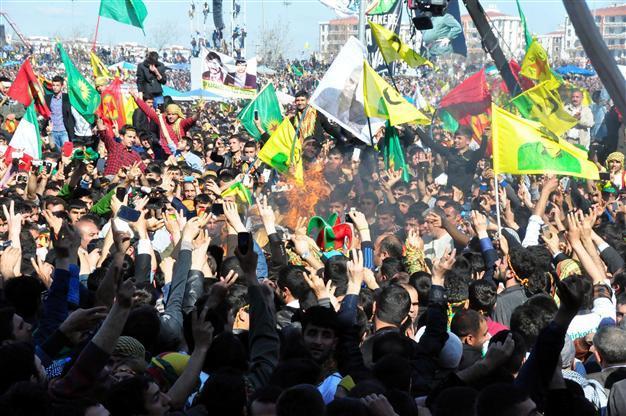Despite noting flaws, Öcalan makes fresh push for stalled peace process
DİYARBAKIR/ANKARA

Tens of thousands gathered in Diyarbakır, where a message from jailed PKK leader Abdullah Öcalan was read out, during Nevruz celebrations on March 21. DHA photo
Exactly a year after his historic cease-fire call to members of the outlawed Kurdistan Workers’ Party (PKK), the jailed PKK leader has called on the Turkish government to enable the legal conditions that would ensure the viability of the stalled peace process.
In a message read out during Nevruz celebrations in Diyarbakır on March 21, Abdullah Öcalan said the question that needed answering today is whether the rest of the peace process will falter until collapse, or alternatively blossom into a “full and radical democracy” in Turkey.
Nevruz is the spring festival which has particular political importance for Kurds. Like last year in Diyarbakır, Öcalan’s message was read out both in Kurdish and Turkish by Peace and Democracy Party (BDP) deputy Pervin Buldan and People’s Democratic Party (HDP) deputy Sırrı Süreyya Önder.
The past year has brought the peace process to a critical juncture, Öcalan stated. “Either the conspirator-pro-coup 200-year-old regime based on capitalist modernity will restore itself to power, or Turkish-Kurdish relations that are grounded on its historic route will be resolved via passing through most comprehensive democratic reforms and by breaking down the conspirator-pro-coup mechanisms. All other stop-gap measures and temporary fixes have completed their life spans,” he added.
“What has continued until today was a dialogue process and was important. Along this process, both sides tested each other’s goodwill, realism and adequateness. Both sides have passed this quest for peace with determination despite the government’s delaying practices and attempt to run the process one-sidedly, avoiding the establishment of legal grounds,” Öcalan said.
Process 'not binding'He added that the current dialogue processes were “not binding” and warned of the fragile current legal framework.
“They cannot ensure the sufficient guarantee for a lasting peace. In the current state of affairs, a legal framework has become a necessity for negotiation systematics,” Öcalan stated.
“Peace is more difficult than war, but every war has its peace. We were not afraid while resisting and we will not be afraid while making peace either,” he said, vowing not to burn bridges yet.
The stalled peace process is aimed at ending the three-decade-long conflict between Turkey’s security forces and the PKK, in order to pave the way for the resolution of the century-old Kurdish issue. PKK leader Öcalan has been serving a life-sentence in an island prison in the Sea of Marmara since he was captured in 1999.
Prime Minister Recep Tayyip Erdoğan’s government took the initiative for the peace negotiations, also dubbed the “resolution process,” by tasking top intelligence officials with the launching of talks with Öcalan in 2012 that led to a ceasefire a year ago.
Öcalan’s call for the continuation of the process comes at a time when Erdoğan has put the peace process on the backburner in order to deal with a corruption scandal, perhaps the biggest crisis of his 11-year rule. Erdoğan has framed the corruption and bribery investigation as a plot both against his government and the peace process.
That scandal has developed into a power struggle between Erdoğan, who denies claims of corruption in his inner circle, and U.S.-based Islamic preacher Fethullah Gülen, who has many followers in Turkey and in the state apparatus.
While the prime minister says the corruption scandal is partly a bid by Gülen to undermine the peace process in the southeast. The Gülen movement denies being against the peace process.
The PKK ceasefire has largely held since declared by Öcalan last Nevruz, and the government has implemented tentative reforms aimed at boosting Kurdish rights since then.
PKK commanders in the Kandil Mountains of northern Iraq have warned of renewed violence unless the process moves faster.
The PKK is designated a terrorist organization by Turkey, the United States and European Union, and Erdoğan has invested serious political capital in the peace talks in the face of fierce nationalist opposition in Turkey.
In the run-up to local elections on March 30, during electioneering, Erdoğan has repeatedly said the corruption probes are aimed at scuppering the peace process.
“This person in Pennsylvania [a reference to Gülen] is performing attacks in a treasonous way in order to prevent the peace process and this country’s unity and solidarity,” Erdoğan said on March 9 during a rally in the Southeastern Anatolian province of Şanlıurfa.
